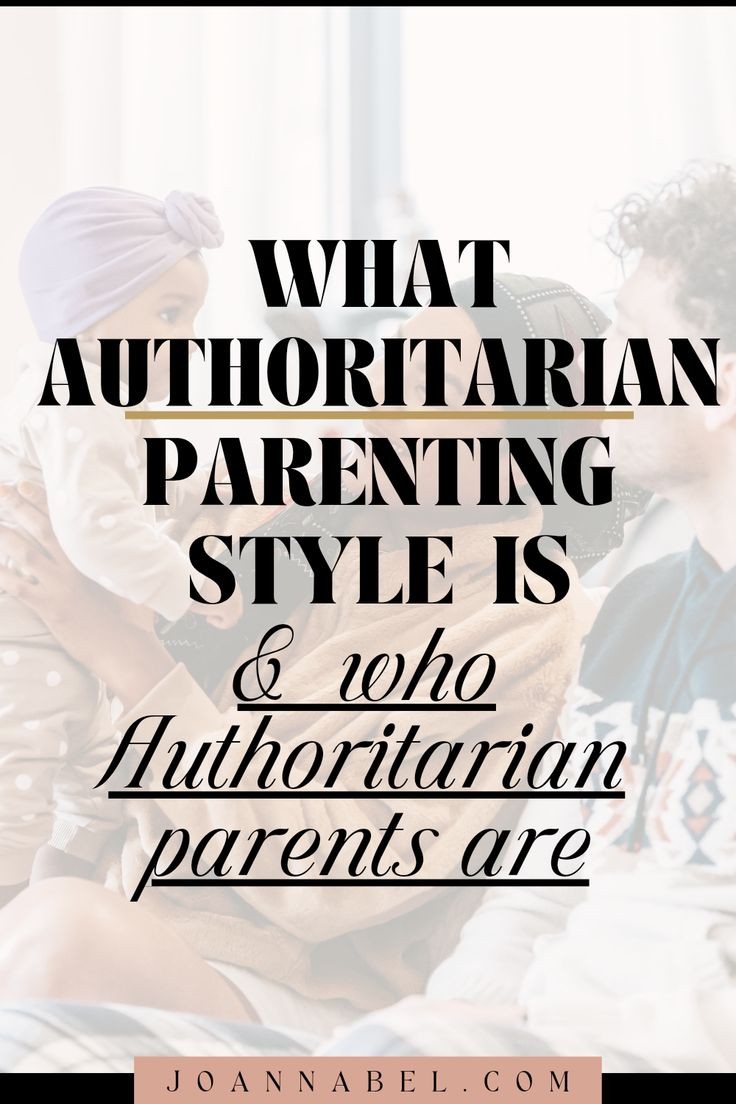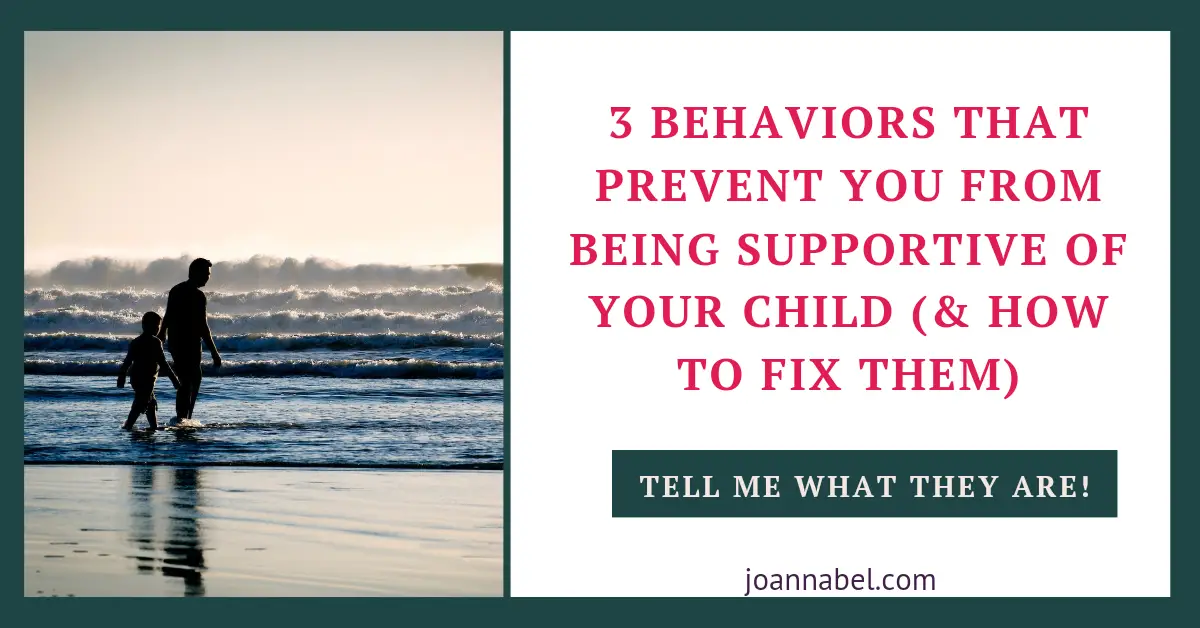If you wonder what Authoritarian parenting style is or whether your parenting style is a Authoritarian parenting style, this post is most likely to provide you with the right answers.

What Is Authoritarian Parenting Style And Who Are Authoritarian Parents?
Authoritarian parenting style is a parenting style recognisable by the parents’ low levels of emotional warmth and responsiveness in their relationship with their children and setting high demands for their children’s obedient behavior in a cold even harshed manner.
But we’ll see if this is the whole picture of this parenting style throughout this post, so make sure to stay until the end.
In this post we’ll talk about:
- What is the authoritairan parenting style and who discovered it
- How authoritarian parenting got discovered, when it was investigated, and by who
- Authoritarian parents behavior and characteristics
- What are the effects of authoritarian parenting style on child development and child behavior
- The difference between authoritairan parenting and authoritative parenting
- The difference between authoritairan parenting and neglectful parenting
- Why parents might be authoritarian
- Hot to “stop” authoritarian parenting
And more! I’ll also mention what to do to move on from an authoritarian parenting style.
Let’s jump right in!
Note: Although I am a Clinical Social Worker, engaging with this website does not establish a professional social worker-client relationship. The information provided here is for general purposes only and should not be considered professional advice. While we strive to ensure accuracy and reliability, this content is not a substitute for professional guidance. For specific concerns, issues, or situations, it is essential to consult a qualified professional and present your situation. Read the full Disclaimer here.
WHAT IS THE AUTHORITARIAN PARENTING STYLE?

The authoritarian parenting style is known in modern social science theories and practices, as well as in public discourse, either as:
- a parenting style in which parents nurture a close and (too) connected (enmeshed) relationship with a child, and set too high expectations for discipline, obedience, and structure on children (highly rigid – inflexible), or
- parenting style in which parents have low levels of emotional warmth and responsiveness in their relationship with their children and they set high demands for their children’s obedient behavior in a cold even harshed manner.
David Olson’s Circumplex Model of Marital and Family System, as one of the most widely used models for describing and inspecting the patterns of family functioning, describes the authoritarian parenting style as a style with:
- high rigidity (inflexibility) and
- high enmeshment of the relationships (too close).
As the authoritarian style becomes more extreme and intensifies, the model expects how family moves to the style determined as the “rigidly enmeshed” style, which is particularly problematic for adolescents.
If you want to understand more about the Olson’s model and how it inspects parenting styles, read it in my post that covers all 5 parenting styles. Here is the link to it.
But if you’re confused about what parenting styles are in the first place, let’s quickly take care of this first.
WHAT DOES A PARENTING STYLE MEAN?
Parenting style refers to the consistent and stable patterns of demands, structure, and responsiveness that parents cultivate in all of their interpersonal interactions with their children. The parents’ practices are dependent on these patterns. That’s why it’s called style – it is perpetual and it’s resistant to events, situations, a child’s age, and developmental phase. This doesn’t mean that it’s unchangeable, it only means that it is constant.
If you need to know more about the 5 parenting styles, I got you – read my post that explores them in great detail: What Are The 5 Parenting Styles: All You Wanted To Know.
AUTHORITARIAN PARENTING STYLE (LONGITUDINAL) STUDY
The authoritarian parenting style was first investigated and described by the deceased Diana Baumrind, a developmental psychologist with a Ph.D. in psychology at the Institute of Human Development, University of California, Berkeley, who is now internationally famous as a pioneer of research on parenting styles.
She discovered the authoritarian parenting style alongside two other parenting styles – authoritative and permissive, in her groundbreaking research on prototypes of parenting styles, the famous ”Baumrind’s parenting typology”.
Baumrind did it on the basis of home observations, laboratory observations, and interviewing the parents.
The psychologist researched parenting styles in a longitudinal study of parents, which began in the early 1970s, where she followed families with preschoolers to their late adolescence.
Also, she was one of the first to include both mothers and fathers.
Read about authoritative and permissive parenting styles here:
WHAT ARE THE THREE STYLES OF PARENTING AS DESCRIBED BY PSYCHOLOGIST DIANA BAUMRIND?
Diana Baumrind identified and described three styles of parenting:
- Authoritarian,
- Authoritative (democratic), and
- Permissive (laissez-faire) parenting style
Each was associated with 1 pattern of child behavior.
These 3 patterns of child behavior were:
- Pattern A – Assertive, self-reliant, self-controlled, buoyant (cheerful, optimistic), and affiliative.
- Pattern B – Discontented, withdrawn, and distrustful.
- Pattern C – Little self-control or self-reliance, and retreat from innovations.
Pattern A was associated with an authoritative parenting style.
Pattern B with authoritarian parenting style.
And pattern C with a permissive parenting style.
She did it on the basis of home observations, laboratory observations, and interviewing the parents.
AUTHORITARIAN PARENTING RESEARCH
Baumrind’s research on parenting styles has had a significant influence on the field of parenting and child development, with hundreds of studies replicating and validating her findings.
Her work has been widely recognized and authenticated, underscoring the importance of understanding the different parenting styles and their impact on children’s development.
So, since Baumrind had guided her groundbreaking investigation in the 60s/70s, there was a great deal of research with a focus on the relationship between the parenting styles she had identified.
Many authors continued to build upon her findings.
David Olson’s Circumplex Model of Marital and Family Systems (the Circumplex comes from the expression “circular order of complexity”) model introduced 5 parenting styles.
His model is one of the most widely used models for inspecting and describing the patterns of family functioning.
This model inspects how balanced is the family system evaluated through 3 dimensions (cohesion, flexibility, communication), where the authoritarian parenting pertains to unbalanced systems.
Balanced means healthy family functioning.
So a balanced system is the system in which there is balanced cohesion, communication, and flexibility, while in an unbalanced system this is not the case.
More details about the model and the 5 parenting styles the model presented, read in my post about 5 parenting styles. Go here: What Are The 5 Parenting Styles: All You Wanted To Know
AUTHORITARIAN PARENTING STYLE DIANA BAUMRIND DESCRIBED
Baumrind describes authoritarian parenting style as a combination of low emotional warmth and high structure and demandingness.
So this meant that authoritarian parents are disengaged and lack responsiveness in their interactions with children and are setting very high demands for loyalty and obedience with no space for any negotiation and deviation from their norms.
In more simplified terms – they are too strict and emotionally unsupportive.
She defined that the authoritarian parenting is characterized by:
- high control,
- high focus on a parent (parent-centric), and
- low emotional warmth and responsiveness.
If you want to know more about emotional warmth and responsiveness and what it is in your parenting capacity, read my post that cover it.
Here is the link: What Is Emotional Warmth In Parenting Capacity?.
THE AUTHORITARIAN PARENTS’ BEHAVIOR AND CHARACTERISTICS OF AUTHORITARIAN PARENTING
The authoritarian parenting style characterizes high levels of rigidity (inflexibility) and high levels of enmeshment (too much cohesion/closeness).
So in this parenting style, relationships can be described as highly rigid and too close.
This means an authoritarian type of parents sets quite rigid rules and expectations for children. And they enforce them very strictly.
Therefore autonomy in children isn’t welcome, nor is really accepted, even when the parents declare that it is.
Also, this means that authoritarian parents show that they expect and demand (absolute) obedience as well as absolute loyalty from their children which they perceive and value obedience as a virtue.
To make children comply to their demands they use punitive and forceful methods to shape desirable behavior when a child’s way of thinking or behaving is on conflict with what the parent considers to be appropriate.
They expect children to follow their commands so they leave no space for any negotiation.
This means that the child is kept in their place, restricted in autonomy with order, structure, and control conserved.

The Circumplex model inspects and explains how these parents have high demands and expectations for the closeness of family members.
Note that this doesn’t necessarily mean emotional warmth because with these parents it’s not about nurturing it’s about control.
This then means: the more cohesion they achieve the more control they obtain.
When the authoritarian style intensifies and gets out of balance even more, the model says the family moves towards the unbalanced style called rigidly enmeshed.
The family system organized like this is particularly problematic for adolescents considering it’s highly restrictive concerning the child’s freedom and autonomy, who naturally rebel against it.
As adolescents need more autonomy, this is undoubtedly logical.

What can create confusion in understanding whether parenting is authoritarian is the fact that many people may associate strictness with rigidness and softness with weakness. (They think in extremes.)
But keep in mind that the Authoritative parents may be more or less strict but they don’t restrict the child’s autonomy or independence. As opposed to authoritarian parents who do because they don’t want to share any control with the child.
At the same time authoritative parents will be more or less close to their child (not too close and not too distant) but this closeness will be focused on nurturing and emotional support and not on blocking the separation like this is the case with authoritairan parenting.
This closeness and softness won’t make authoritative parents weak and too permissive because they will still be ready to make children comply to their standards that are in the child’s best interest.
The Circumplex model clearly states that the family will pertain to democratic (authoritative) style if they are somewhat flexible to very flexible (and somewhat close to very close). But they won’t be inflexible and too flexible (and they won’t be disengaged or too close).
This means that if they are at “the extremes”, then they belong to another parenting style, and not authoritative. (Read about other parenting styles here.)
WHY ARE PARENTS AUTHORITARIAN?
Authoritarian parenting may be influenced by cultural values and beliefs, as well as by personal experiences with authority figures.
Some parents may adopt an authoritarian parenting style as a reaction to their own childhood experiences, such as experiencing overly permissive or neglectful parenting.
Recent research, revealed that a parent’s genes play a great role in parenting too.
It uncovered that genetic influence in parenting go from 23 % to 40 % of parental emotional warmth and responsiveness, control, and negativity towards their children.
What wasn’t clear is whether genes directly influence parenting or this happens indirectly, through parent personality for instance.
AUTHORITARIAN VS. NEGLECTFUL (UNINVOLVED) PARENTING
Let’s compare authoritarian parenting and neglectful parenting – uninvolved parenting style, is a style characterized by high levels of chaos (too flexible) and disengagement (disconnected) where children are ignored, and their choices prevail over their parents’ unless these activities get in the way of the parents’ activities.
As the uninvolved style becomes more extreme, it moves toward the “chaotic disengaged” pattern – where children are on their own without emotional support and a lack of consistent rules and expectations.
As you can see, the Uninvolved parenting style is characterized by excessive flexibility as opposed to the authoritarian style where flexibility is highly discouraged (inflexible structure).
And when it comes to closeness of family members in the uninvolved parenting style the relationships are disengaged and distant as opposed to the authoritarian style where the relationships are too close.
For more details about the uninvolved parenting style, read my post dedicated to it. Follow this link: What Uninvolved Parenting Really Is And Who Uninvolved Parents Are (Neglecting Parenting).
AUTHORITARIAN VS. AUTHORITATIVE PARENTING
The authoritative parenting style is a combination of emotional warmth and responsiveness, but with the balanced (flexible) structure, boundaries, and limits, and with parents empowering the children to do their best and build autonomy.
I have 3 different posts that cover these aspects in more detail. Here are the links:
Baumrind called authoritative parenting effective parenting because she had discovered that it gives great results.
In the Circumplex model’s Authoritative (Democratic) parenting style is the balanced type among the other 4 types where the families that fall under the democratic spectrum range from somewhat connected to very connected (for the cohesion dimension – togetherness).
And they vary from somewhat flexible to very flexible (when it comes to the flexibility dimension).
The family is more functional as the levels of balanced cohesion and balanced flexibility are higher.
So, in comparison to authoritarian parenting where flexibility is low and closeness is too high, in authoritative parenting, family has balanced levels of closeness and balanced levels of flexibility.
To learn more about authoritative parenting style read my post that explores it in much more detail. Here is the link to it.
Or if you need a more thorough comparison between these two parenting styles, read my blog post:
ARE AUTHORITARIAN PARENTS OVERPROTECTIVE?
Authoritairan parents may be overly protective and go after every child’s need.
Again, this doesn’t necessarily mean they will be nurturing and supportive because what lies behind high protectiveness is the need or aim for high control.
We may all be very protective at times, for example if we’ve recently experienced something that makes us behave this was as a result, but if this is usual, it means that we are controlling because excessive protectiveness is not in the child’s best interest.
That’s because it’s disabling for them considering it’s preventing them from gaining more competence, experience, and confidence in life.
If you are not letting them exercise autonomy, practice independence, and foster individuality, you’re spending them a message that they’re not capable enough to do anything on their own and that they’re not reasonable enough to make sound decisions or learn to do so.
Read also:
HOW DOES AUTHORITARIAN PARENTING AFFECT OBEDIENCE?
Authoritarian parenting can lead to obedient and disciplined children.
But it may also lead to resentment and rebellion in some children.
The thing is some people are more conventional and confirming than others and so are children.
So then if a child is not a strong willed (more free spirited) child by nature they’ll have less problems with this type of parenting.
On the other hand a more strong willed children will not be willing to cope with authoritairan parenting style and will rebel against it from the youngest of age.
This will be highly dependent on the society in which a family is positioned but even when most people in one society positively value authoritarianism some individuals may still experience difficulties with it because they may value and favor a more democratical approach.
AUTHORITARIAN PARENTING AND CHILD REBELLION (DOES STRICT PARENTING LEAD TO REBELLION?)
Depending on how authoritarian the parenting is, most children once they reached adolescence will have trouble with this parenting style. Considering autonomy is the most important for them.
Additionally, in this development phase the influence of parents weakens and now their peers have more significance in lives of adolescents.
But, remember in some cultures authoritarian parenting, as well as authoritarian leadership in general, is more welcomed and may be well received because it is perceived as a positive atribute. This means that people will have less problems with it then.
More on this a little later.
You may want to read also:
AUTHORITARIAN PARENTING DISCIPLINE
Parents who have an authoritarian parenting style often demand obedience and conformity from their children and use punishment and negative reinforcement to enforce their rules and maintain control over their children.
They may rely on physical punishment or verbal criticism to discipline their children and may be less likely to explain the reasoning behind their rules or decisions.
Additionally they may not foster a sense of open communication, as they may not be receptive to their children’s opinions or feelings.
You may find useful:
AUTHORITARIAN PARENTING RULES
Authoritarian parents believe in strict control over their children and they enforce their rules without question or explanation.
This means that they even won’t let children seek explanation for certain expectations their parents impose nor will they let children oppose their standards.
So these parents will have a difficulty to foster a sense of open communication, as they may not be receptive to their children’s opinions or feelings.
This suggests that they won’t allow negotiation to children which means that children aren’t allowed to represent themselves and grow their autonomy.
And this is very disabling for children especially long-term. Also, it’s in conflict with fulfilling relationships because inequality presents itself as the child grows more and more.
This is because a child isn’t seen and treated as sovereign being and their opinions and feelings are positioned as less valuable and influential.
Read also:
AUTHORITARIAN PARENTING PUNISHMENT
So this parent uses punitive and forceful methods to shape self-will when a child’s way of thinking or behaving conflicts with what the parent considers to be appropriate.
This suggests that these parents may use punishment regularly especially if they aren’t able to shape the child’s behaviour to be in a way they imagine. Considering some if them foster harsh-mannered treatment this means that the punishment they use may be harsh and this is a problem because it’s potentially harmful for the child.
With punishment we need to be very careful because wrongful implementation creates more harm than good, and often vreates only harm.
So when the punishment isn’t focused on learning it’s hurtful/harmful.
Learn more about how to use punishment the right way here: What Is The Best Way To Punish A Child?
If you need to learn to differentiate right and wrong when it comes to punishments, then what you’ll find handy is my concise digital download with dos and don’ts of punishing and helpful tips:
HOW DOES AUTHORITARIAN PARENTING AFFECTS THE CHILD? CHILD DEVELOPMENT, CHILD MENTAL HEALTH, AND CHILD OUTCOMES
When Diana Baumrind inspected parenting styles she detected the style based on the pattern of child’s behavior and in the case of authoritarian style the children were discontented, withdrawn, and distrustful.
When it comes to mental health of children raised by parents wuth an authoritarian parenting style, they may be more likely to develop anxiety, depression, and other mental health problems. Baumrind discovered that authoritarian parenting has been associated with poor academic achievement and anxiety-depressive symptoms.
When it comes to child development, children raised by authoritarian parents may struggle with maturity, self-esteem, and independence, as their parents do not encourage them to express their thoughts and feelings or make their own decisions.
That’s because they restrict autonomy to keep all the power in their hands by maintaining high level of control and restrictiveness.

These children:
- can often behave in a conflicted-irritable manner
- tend to be unhappy
- are vulnerable to stress
- lack stability/unstable
- tend to be moody
- can act unfriendly.
All of this is true for the Western world. Keep in mind that culture plays a great role and in some other cultures authoritarian parenting may not give these results and may even bring positive ones. I’ll explore this in the next subheading.
You’ll find useful also:
If you found the information on the blog helpful & inspirational and you feel like giving back, you can do it by clicking the donate button after entering amount you’re comfortable with. I’ll use it to create and deliver more useful content and resources like this. Thanks for your precious contribution!
AUTHORITARIAN VS. PERMISSIVE PARENTING
Now let’s see how permissive parenting is different from authoritairan parenting.
- In Baumrind’s typology, what can be considered strict parenting is Authoritarian parenting because these parents set high demands on their children’s behavior in a cold, rigid, even harsh manner while lacking emotional warmth and responsiveness.
- Permissive style is the opposite, with parents who are emotionally warm and responsive to their children, but disregard or overlook providing enough guidance, structure, or appropriate demands for maturity.
And just to compare this to the authoritarian style in Olson’s Circumplex model:
- in Olson’s model, the authoritarian parenting style is characterized by high rigidity (inflexibility when it comes to rules and discipline) and high enmeshment (too much cohesion/closeness of relationships).
When it comes to the Strict style (or Rejecting parenting style) in Olson’s model that fits the Baumrind’s authoritarian style, it is described as a style too low on closeness while not being flexible enough (inflexible). (You can read about the rejecting style in my post that covers it in more detail. Follow the link.)
Here, the parents are imposing very strict rules and harsh discipline and are restricting freedom while being very disconnected emotionally from the child.
What these two parenting styles have in common as Olson’s model inspects, is the closeness or enmeshment of the relationships – closeness that’s too intense for a family to achieve good balance.
AUTHORITARIAN PARENTING AND ACADEMIC PERFORMANCE
Data from multiple research has uncovered that authoritarian, permissive, and neglectful parenting styles are associated with lower academic performance.
On the other hand, the authoritative parenting style has been found more effective than them in promoting academic achievement and academic accomplishments.
Ultimately, providing emotional support, guidance, and high expectations for children’s academic performance, as key components of the authoritative parenting style, are to be prioritized so that parents can help their children succeed academically and develop into well-adjusted adults.
And despite having high expectations for their children’s academic and behavioral performance, authoritarian parents may not provide the emotional support necessary for their children to meet those expectations.
This lack of emotional support can ultimately hinder children’s academic success.
However, it’s important to consider cultural differences when evaluating the effectiveness of parenting styles, as cultural norms can influence how permissiveness and authoritarianism are perceived.
Therefore, what’s most important is the child’s perception and personal experience of how their parents treat them.
For example, in some cultures, permissiveness or strictness may be viewed more positively than in Western cultures. As such, children may still achieve academic success in these cultures despite the parenting style being different from the authoritative style typically associated with academic success in Western cultures.
In a society that places a high value on authoritarianism, children may thrive academically because strictness is perceived as a positive thing. This may be viewed as a form of training and support that is more culturally acceptable than in a society that values a different approach to parenting.
Even Baumrind uncovered this in her research, when she discovered how African-American girls from low-income families in the US were very responsive to their authoritarian parents and were showing signs of great resilience, assertiveness, and independence.

AUTHORITARIAN PARENTING IN DIFFERENT CULTURES
As Western culture continues to expand its reach and influence, more and more people are adopting its values.
However, this doesn’t mean that parenting practices have to be the same across cultures. There’s no universal standard for childhood.
Instead, it’s important to approach other cultures with an open mind and learn from their values, customs, circumstances, and expertise.
For example, if a society values individualism, it may view close relationships as restrictive, whereas a society that values collectivism may see them as essential.
Regardless of cultural differences, what’s important is that the parenting style is nurturing, respectful, and provides guidance to help children grow into responsible and independent adults.
Therefore, instead of focusing on a specific parenting style, we should prioritize effective communication, mutual respect, and consistency in our approach. This is why authoritative parenting tends to be the most successful approach to raising children.
HOW TO MOVE AWAY FROM AN AUTHORITARIAN PARENTING STYLE?
If you’ve found that you are more authoritarian than you’d like to be and you’d like to start moving away from the authoritairan parenting, here are a few tips to get you started changing your situation:
- flexibilize (relax) demands, expectations, and rules
- let a child ask questions, seek explanations, and negotiate for themselves (normalize negotiation)
- include a child into conversation
- support child independence and autonomy
- support a child’s participation in decision-making
- support a child’s individuality
- permit more separation and learn how to tolerate it more
- foster close connections with the child but avoid excessive closeness, high control, and excessive protection
- let a child gain more experience and make mistakes
- let and insipire a child initiate activities more
- be more supportive and less demanding (high expectations are needed, this is about setting impossible-to-meet standards).
- help a child learn how to be more responsible for ther actions and life.
Latest Posts:
- Special Gifts to Let Someone Know You’re Thinking of Them (13)

- 100 Ways to Challenge Yourself (Without Stretching Yourself Too Thin)

- What To Do When Your Parent Struggles With Alcohol

- How To Navigate Moving to a New Home With Your Kids

- Prenups for Young Couples (A Modern Approach)

- What Happens When You Sign A Prenup (Relationship-Wise + Legally)

FINAL THOUGHTS ON AUTHORITARIAN PARENTING
I hope you found the information on authoritairan parenting helpful and that this post cleared things out for you.
If you have any more questions leave them in the comments section! I’ll see you there.









Leave a Reply